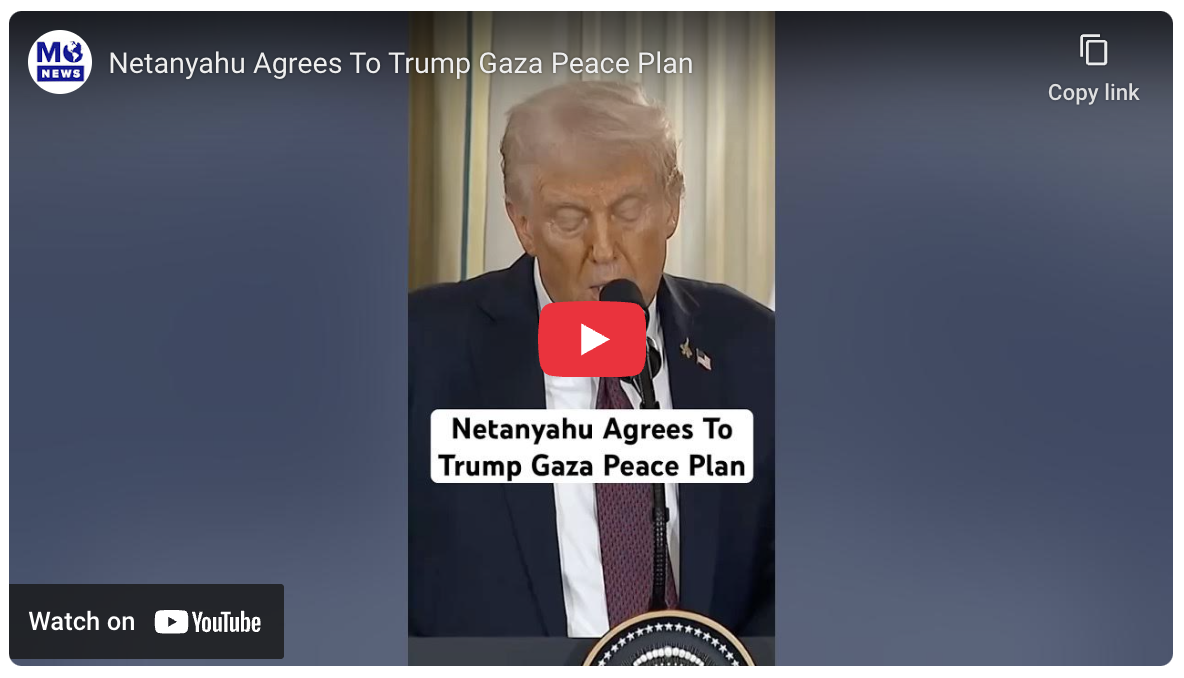Netanyahu Agrees To Trump Gaza Peace Plan — Will Hamas?
Israeli Prime Minister Benjamin Netanyahu agreed to President Trump’s 20-point plan to end the war in Gaza during a meeting at the White House on Monday.
It calls for the release of hostages, both living and deceased, the disarmament of Hamas, the withdrawal of Israeli forces, and a ban on Hamas holding political power in Gaza. The prime minister of Qatar and the chief of Egypt’s General Intelligence Service said late Monday that Hamas negotiators pledged to review Trump’s proposal in good faith and respond.
The plan was negotiated with Arab and Muslim leaders — including from Qatar, Jordan, the United Arab Emirates, Indonesia, Pakistan, Turkey, Saudi Arabia and Egypt — who all said in a statement Monday they welcomed Trump’s “sincere efforts” to end the Gaza War.
“I believe that today we’re taking a critical step toward both ending the war in Gaza and setting the stage for dramatically advancing peace in the Middle East,” Netanyahu said.
INSIDE THE PLAN
The White House released its proposal shortly before the press briefing, outlining a 20-point framework to end Israel’s war in Gaza and achieve peace in the region.
Immediate Ceasefire & Hostage Release: If accepted, the war ends immediately, military operations are suspended, and all Israeli hostages (alive and deceased) are released within 72 hours. Israel will begin a phased withdrawal tied to Hamas disarmament.
Prisoner Exchange & Amnesty: Israel will release 250 life-sentence prisoners and 1,700 Gazans detained since Oct. 7, 2023. Hamas members who disarm and commit to peaceful coexistence will receive amnesty or safe passage abroad.
Governance & Oversight: Gaza will be run by a temporary “technocratic, apolitical Palestinian committee” under an international “Board of Peace” chaired by Trump, with oversight from global partners. Hamas will have no role in governing Gaza.
Aid, Security & Redevelopment: Humanitarian aid and reconstruction will flow into Gaza, overseen by the UN and Red Crescent. An International Stabilization Force will secure Gaza and train Palestinian police. Gaza will be rebuilt with international investment and developed into a “terror-free” zone.
Netanyahu still opposes any type of two-state solution, but the plan does appear to open the door to dialogue “between Israel and the Palestinians to agree on a political horizon for peaceful and prosperous co-existence.”
Trump warned that if Hamas rejects the plan, the U.S. will back Israel’s continued military offensive. Netanyahu took a much harsher tone, saying, “If Hamas rejects your plan, Mr. President, or if they supposedly accepted and then basically do everything to counter it, then Israel will finish the job by itself. This can be done the easy way or the hard way.”
In recent weeks, the Israeli military has pushed its ground offensive into Gaza City, the densely populated urban center where roughly half the enclave’s residents live.
MORE FROM THE MEETING
Netanyahu also issued a rare public apology to Qatar after Israel’s strike in Doha earlier this month. Netanyahu stressed the target was Hamas, not Qatar, and expressed regret for the loss of a Qatari security officer.
The public apology was a key Qatari demand for reopening Doha’s mediation with Hamas on a ceasefire and hostage deal. Hamas’ top political leadership lives in Doha and survived the strike.
Trump is pushing a trilateral framework with Israel and Qatar to resolve grievances and advance his Gaza peace plan. Qatar has significant influence over Hamas.

